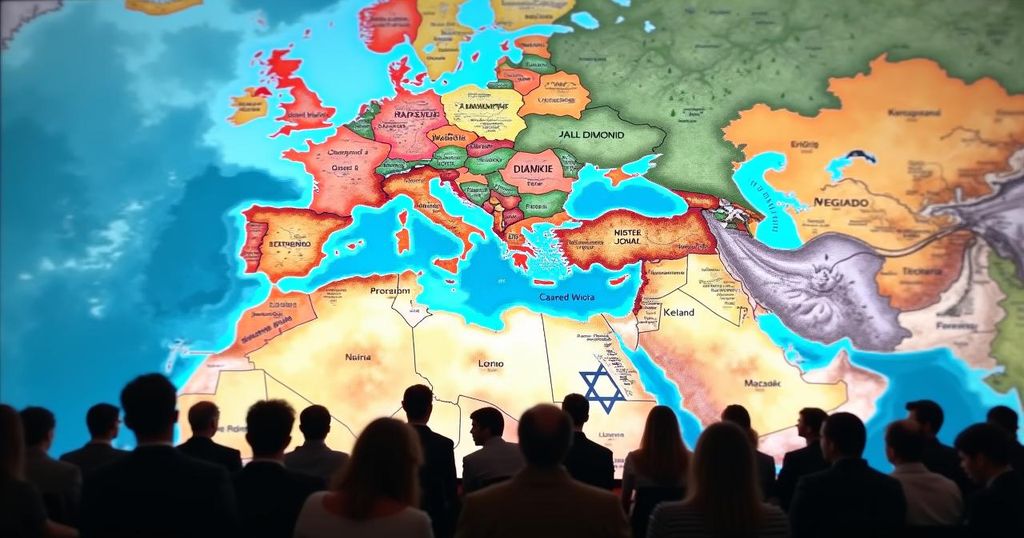Israeli Prime Minister Benjamin Netanyahu presented two maps at the UN, both omitting Palestine and illustrating a dichotomy between nations aligned with Iran, marked “The Curse,” and those cooperating with Israel, labeled “The Blessing,” such as Saudi Arabia and Egypt. His speech emphasized Iran’s destabilizing influence in the region, framing Israel as a defender against these threats while highlighting fragile alliances. The lack of Palestinian recognition in this context provokes critical discussions on ongoing geopolitical tensions and future diplomatic relations.
At the United Nations General Assembly, Israeli Prime Minister Benjamin Netanyahu showcased two maps on Friday, which omitted any reference to Palestine. One map, in his right hand, depicted Middle Eastern countries associated with Iranian influence and was labeled “The Curse,” while the second map, in his left hand, included nations such as Egypt and Saudi Arabia, termed “The Blessing.” The absence of Palestine in both maps raised significant implications about its recognition in regional geopolitics. During his address, Netanyahu connected the map titled “The Curse” directly to Iranian influence, asserting that Iran and its affiliates were the root causes of regional instability. He highlighted Iran’s military and financial backing of groups such as Hezbollah and Hamas as evidence of its destabilizing role. Netanyahu maintained a strong stance, declaring that Israel was compelled to defend itself against threats posed by Iranian-aligned forces. He issued a stark warning to Iran by stating, “If you strike us, we will strike you,” emphasizing Israel’s readiness to extend its military reach throughout the region if warranted. Despite the ongoing hostilities, Netanyahu’s inclusion of countries like Saudi Arabia in the green map suggests an effort to frame potential alliances against Iranian dominance. Following a history of hostilities, Saudi Arabia has indicated that normalization with Israel is contingent upon the establishment of a Palestinian state. This stance complicates current negotiations, especially in light of recent conflicts. Additionally, Egypt and Sudan were also prominently featured on the green map, reflecting their strategic partnerships with Israel. Egypt, under a peace treaty established in 1979, has maintained crucial ties with Israel, especially related to security coordination concerning Gaza. In contrast, Sudan’s recent shift following the Abraham Accords marks a significant change from its previously hostile relations with Israel. Beyond the Middle East, India’s presence on the green map highlights its growing relationship with Israel under Prime Minister Narendra Modi. India has increasingly cooperated with Israel, particularly concerning defense and technology, despite its historical stance in favour of Palestinian rights. The portrayal of these maps by Netanyahu evokes considerable discourse regarding the political landscape in the Middle East, particularly in terms of recognition and support for Palestinian statehood amidst ongoing tensions with Iranian influence.
The recent presentation by Israeli Prime Minister Benjamin Netanyahu at the UN General Assembly focused on the geopolitical complexities of the Middle East, particularly concerning Iran’s role in regional conflicts. Through his visual representation of the Middle East, Netanyahu aimed to delineate allies from adversaries, specifically framing countries that have normalized or are in the process of normalizing relations with Israel as “blessings,” while highlighting Iran as a principal source of instability and conflict. This approach underscores the sensitive issue of Palestine, often sidelined in current discourse surrounding regional security, alliances, and foreign relations.
In summary, Netanyahu’s maps presented at the UN serve as a symbolic representation of the current state of affairs in the Middle East, emphasizing alliances with certain Arab nations while neglecting the recognition of Palestine. His remarks reinforce Israel’s narrative of self-defense against Iranian threats, positioning regional dynamics as a binary between allies and adversaries. This dichotomy raises important questions about the prospects of Palestinian statehood and the future of diplomacy in the region, particularly amidst escalating tensions and shifting alliances.
Original Source: www.ndtv.com







